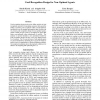Free Online Productivity Tools
i2Speak
i2Symbol
i2OCR
iTex2Img
iWeb2Print
iWeb2Shot
i2Type
iPdf2Split
iPdf2Merge
i2Bopomofo
i2Arabic
i2Style
i2Image
i2PDF
iLatex2Rtf
Sci2ools
AAAI
2015
2015
Goal Recognition Design for Non-Optimal Agents
Goal recognition design involves the offline analysis of goal recognition models by formulating measures that assess the ability to perform goal recognition within a model and finding efficient ways to compute and optimize them. In this work we present goal recognition design for non-optimal agents, which extends previous work by accounting for agents that behave non-optimally either intentionally or na¨ıvely. The analysis we present includes a new generalized model for goal recognition design and the worst case distinctiveness (wcd) measure. For two special cases of sub-optimal agents we present methods for calculating the wcd, part of which are based on novel compilations to classical planning problems. Our empirical evaluation shows the proposed solutions to be effective in computing and optimizing the wcd.
Related Content
| Added | 27 Mar 2016 |
| Updated | 27 Mar 2016 |
| Type | Journal |
| Year | 2015 |
| Where | AAAI |
| Authors | Sarah Keren, Avigdor Gal, Erez Karpas |
Comments (0)

